 Logicmojo - Updated Jan 2, 2024
Logicmojo - Updated Jan 2, 2024
Data Scientist Salary in India (2024)
The average data scientists salary is ₹698,412. An entry-level data scientist can earn around ₹500,000 per annum with less than one year of experience. Early level data scientists with 1 to 4 years experience get around ₹610,811 per annum.
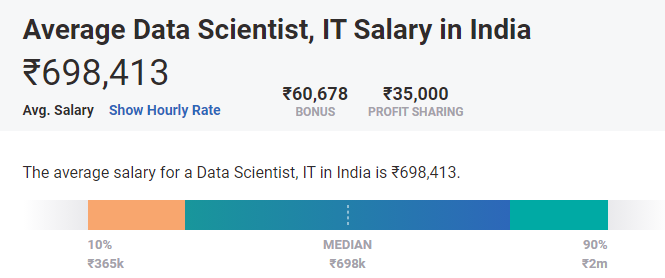
A mid-level data scientist with 5 to 9 years experience earns ₹1,004,082 per annum in India. As your experience and skills grow, your earnings rise dramatically as senior-level data scientists around more than ₹1,700,000 a year in India!
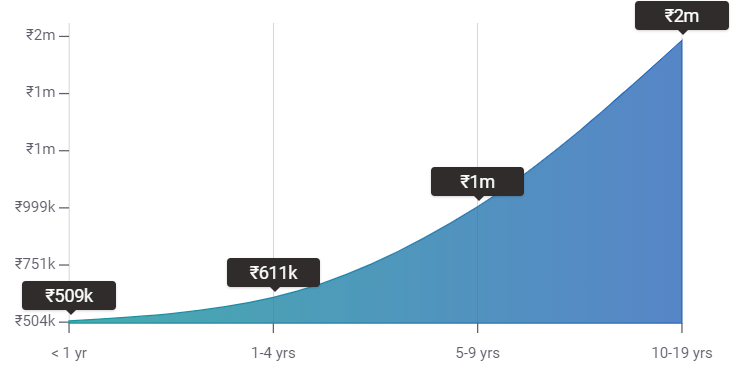
But of course, the Data Scientist salary depends on several factors, including company size and reputation, geographical location, education qualifications, job position, and work experience. Reputed companies and big players in the Big Data industry like Amazon, Airbnb, Spotify, Netflix, IBM, Accenture, Deloitte, and Capgemini, to name a few, usually pay high compensation to Data Scientist. Also, the more your past work experience in Big Data, the higher will be your market value.
Factors Affecting Data Scientist Salary in India
Data Scientist salaries in India can be affected by multiple factors. Let’s see some primary salary affecting factors:
1.Location
2.Experience
3.Skills
4.Company
Data Scientist Salary by Location
The number of job opportunities and the annual data scientist salary in India for data innovators is the highest in Mumbai, followed by Bangalore and New Delhi. However, since Bangalore is the startup capital of India, it has the most opportunities for jobs in startups. A data scientist’s salary in Bangalore would more likely to be higher than the other cities as it is considered to be the hub of the tech industry of India.<./p>
According to Payscale, Data scientist salary in India based on location:
Mumbai – ₹788,789
Chennai – ₹794,403
Bangalore – ₹984,488
Hyderabad – ₹795,023
Pune – ₹725,146
Kolkata – ₹402,978
Bangalore, Chennai and Hyderabad are among the highest-paying cities for the Data Scientists in India.
Data Scientist Salary by Experience
Let’s see how a Data Scientist salary in India varies based on experience.
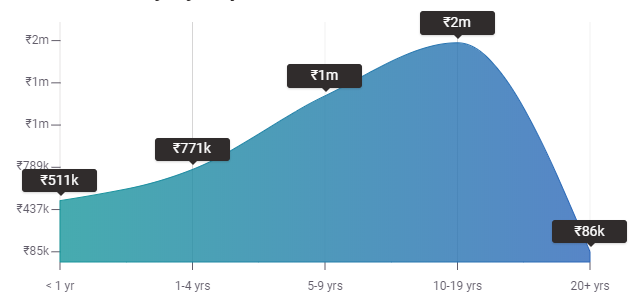
A career in data especially appeals to young IT professionals because of the positive correlation between years of work experience and higher-paying salaries. In this section, we will see how data scientist salary increase based on experience. Salaries in the field of data might look something like the following, in the future:
For a fresh graduate, the average entry-level data scientist salary in India is ₹511,468.
An early career data scientist with 1-4 years of experience earns an average of ₹773,442 annually.
An employee with 5-9 years of experience would have the potential to secure between INR 12-14 lakhs. According to payscale, the average mid-level data scientist salary is ₹1,367,306.
A highly experienced employee with decades of experience or who has held managerial roles can expect anywhere from INR 24 lakhs up to a healthy crore of rupees!



Data Scientist Salary by Skills
In order to secure such a high-paying job, you are expected to go beyond the qualifications of a Master’s degree and be familiar with the respective languages and software utilized for managing data. Some more insights from AIM:
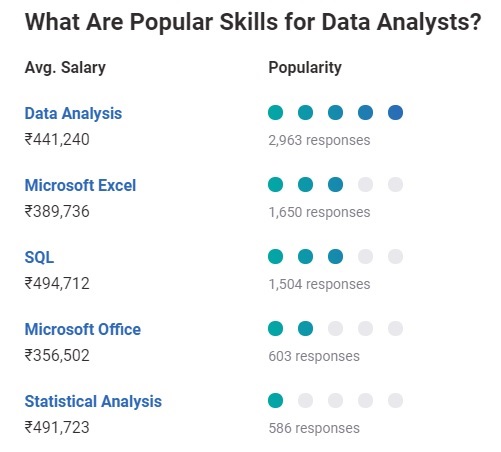
The most important and coveted skill is being familiar with R followed by Python. Python salary in India alone promises of 10.2 lakhs INR.
The combination of knowledge of Big Data and Data Science increases a Data Analyst’s salary by 26% compared to being skilled in only one of the areas.
SAS users are paid between INR 9.1-10.8 lakhs versus SPSS experts earning INR 7.3 lakhs.
Machine Learning salary in India starts from around 3.5 lakhs INR to if you grow in this field it can take a leap up to 16 lakhs INR. Python is one of the most recommended languages when it comes to ML, and to add to that, Python developers’ salary in India is among one of the highest.
Extended knowledge of Artificial Intelligence can help you make a career overall. The Artificial Intelligence salary in India offers not less than 5-6 lakhs INR if you are a novice in this industry.
Data Scientist Salary by Companies
Without a doubt, prestigious firms dominate the charts of the highest paying salaries for data jobs. They also hold a reputation for increasing salaries by 15%, annually. Some of data scientists salary provided by top firms:
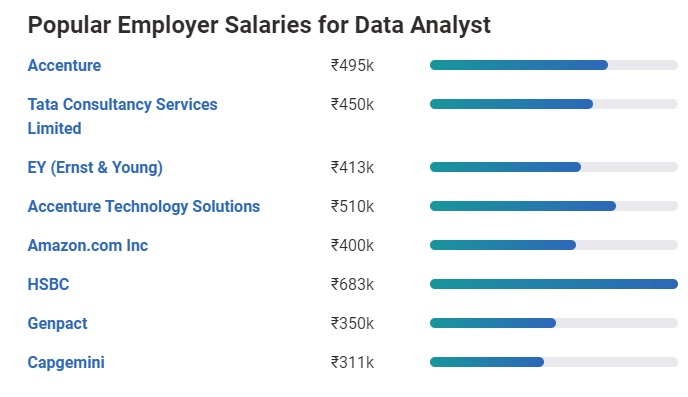
IBM Corp: INR 1,468,040
Accenture: INR 1,986,586
JP Morgan Chase and Co: INR 997,500
American Express: INR 1,350,000
McKinsey and Company: INR 1,080,000
Impetus: INR 1,900,000
Wipro Technology: INR 1,750,000
Skills Required for a Data Scientist
There are few primary skills needed for Data Science :
Algorithms, statistics, mathematics, and machine learning knowledge are all important.
R, Python, SQL, SAS, and Hive are examples of programming languages that are required to be known by a Data Scientist.
Communication skills are required in order to properly communicate the results to the rest of the team.
Business understanding and the aptitude to frame the right questions to ask, and find answers in the available data.

• R: An open source programming language and environment for developing statistical computing and graphics, R is the most popular programming language among data scientists. R provides a broad variety of libraries and tools for cleansing and prepping data, creating visualizations, and training and evaluating machine learning and deep learning algorithms. It’s also widely used among data science scholars and researchers.
• Python: Python is a general-purpose, object-oriented, high-level programming language that emphasizes code readability through its distinctive generous use of white space. Several Python libraries support data science tasks, including Numpy for handling large dimensional arrays, Pandas for data manipulation and analysis, and Matplotlib for building data visualizations.
• SQL: SQL is an important skill to learn for every data scientist. They leverage it for transforming and extracting data out of databases. It is one of the most commonly asked subjects in data science interviews
• Statistics & Machine learning: If you haven’t had many statistical courses during your prior studies, it is helpful to go through an introductory Statistics and Machine Learning course covering the following topic regression (linear/logistics), decision trees, random forest, k-means and KNN
Data Scientist Salary in Other Countries
Salaries offered by the top 5 countries are as follows-
United States
The United States of America is at the top of the list of countries that give high salaries to data scientists who are willing to work for them. The average yearly salary for data scientists in the United States is $120,000 per year. The pay is higher than in any other country for data scientists.
Australia
Australia is ranked second in the list of countries that pay data scientists well. This is evidenced by the influx of data scientists from Australia and other countries to the United States. The average salary for a Data Scientist is between AU$75,233 per year- AU$121,578 per year based on one’s experience.
Israel
Nobody could have predicted that Israel would become a major IT centre, with a plethora of career opportunities for both novice and seasoned data scientists. In Tel Aviv, Israel, working data professionals earn roughly $88,000 per year.
Canada
You’re in for a treat if you’re seeking data science employment in Canada. Data scientists in Canada make roughly $81,000 per year. The starting wage for a data scientist is $77,870 per year and can rise to $117,750 per year.
Germany
In Germany, people looking for data science employment might earn up to 5,960 euros per month. Working data scientists in Germany earn between 2,740 and 9,470 euros per month.
Challenges to Overcome in Data Science Career
1. Preparation of Data
Data scientists spend around 80% of their time cleaning and preparing information before utilising it for analysis in order to improve its quality — that is, to make it accurate and consistent. However, it is the most difficult component of their jobs for 57% of them, who describe it as time-consuming and repetitive. They must analyse terabytes of data on a daily basis across a variety of formats, sources, functions, and platforms while keeping track of their operations to avoid duplication.
One option to overcome this issue is to build AI-enabled data science tools like Augmented Analytics and Auto feature engineering. Augmented Analytics can help data scientists be more productive by automating onerous data purification and preparation tasks.
2. A wide range of data sources
Data scientists will need more data sources to make meaningful decisions as businesses continue to employ a variety of apps and technologies and generate data in a variety of formats. Manual data entry and time-consuming data searches are required in this approach, which leads to errors, repetitions, and, eventually, inaccurate findings.
Organizations demand a single platform that is integrated with several data sources in order to quickly access information from a variety of sources. Data in this single platform can be effectively pooled and regulated in real-time, saving data scientists a significant amount of time and effort.
3. Data Security
As organizations transition into cloud data management, cyberattacks have become increasingly common. This has caused two major problems –
1.Confidential data becoming vulnerable
2.As a response to repeated cyberattacks, regulatory standards have evolved which have extended the data consent and utilization processes adding to the frustration of the data scientists.
Organizations should utilize advanced machine learning enabled security platforms and instill additional security checks to safeguard their data. At the same time, they must ensure strict adherence to the data protection norms to avoid time-consuming audits and expensive fines.
4. Understanding The Business Problem
Before conducting data analysis and designing solutions, data scientists must have a thorough understanding of the business situation. Most data scientists approach this in a mechanical manner, diving immediately into analysing data sets without first determining the business problem and purpose.
As a result, data scientists must follow a certain process before beginning any investigation. After speaking with business stakeholders, the workflow should be developed, and it should include well-defined checklists to aid in the discovery and understanding of problems.
5. Effective Communication With Non-Technical Stakeholders
Data scientists must be able to communicate effectively with executives who may be unaware of the complexities and technical jargon involved in their work. Their solutions are unlikely to be implemented if the CEO, stakeholder, or client cannot comprehend their models.
Data scientists can improve their ability to do this. They can employ concepts like "data storytelling" to provide their analysis and graphics a more methodical approach and an engaging narrative.
6. Data Engineers' Collaboration
Data scientists and data engineers are frequently found working on the same projects in organisations. This necessitates excellent communication between them in order to achieve the greatest results. However, their agendas and workflows are frequently incompatible, resulting in misunderstanding and stifling information transfer.
Management should take proactive initiatives to improve data scientist and data engineer collaboration. By establishing a common coding language and a real-time collaboration platform, it can promote open communication. Furthermore, establishing a Chief Data Officer to manage both divisions has enhanced collaboration between the two groups.
7. Misconceptions about the role
A data scientist in a large firm is expected to be a jack of all crafts, cleaning data, retrieving data, building models, and conducting analysis. This, however, is a tall order for any data scientist. Data visualisation, data preparation, model construction, and other responsibilities must be spread among individuals for a data science team to perform well.
Before beginning to work with any organisation, data scientists must have a firm grasp of their duties and responsibilities.
Conclusion
There are no doors that a data scientist can't unlock because they have all the keys to the home. When working with massive data sets, it provides unrivalled versatility. Assess the capabilities and potential of your future forecast.
There has been an appreciable rise in vacancies for data science jobs and associated occupations in recent years. Irrespective of the nature of the company, big data is gaining momentum nowadays. Data-driven businesses can reap lot of benefits. Data scientists take charge of breaking down huge sets of data into insightful information. When you have knowledge of data science, you can expand your horizons to data analyst, data engineer besides being a data scientist. What are you waiting for? Enter the fascinating world of data science after learning it thoroughly from logicmojo
Good Luck & Happy Learning!!






